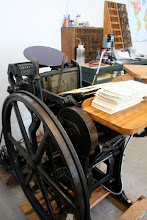A friend of mine sent me this clip from a 1970's episode of Sesame Street. I remember watching Sesame Street as a little kid. I mean, who doesn't remember watching at least a little Sesame Street as a kid? I don't remember this episode though. I also don't remember it being quite so strange, and I don't know, maybe it's just me, but not having seen it for a good twenty+ years and watching just this clip now, I have to say I find it a little odd. But that aside, it's pretty darn awesome that these 1970's youngsters take a drawing of their lost dog to a letterpress printer to have a sign made. Although it's pretty brief, the demonstration of the letterpress process, isn't bad either. The press they're using is even a Chandler & Price, which is the same kind of press as one of the presses at Twin Ravens Press. Anyway, it's entertaining, nonetheless. Check it out!
Friday, February 19, 2010
Subscribe to:
Post Comments (Atom)




4 comments:
Wow! I TOTALLY remember watching this clip when I was a kid! We had five or so episodes of Sesame Street when I was a kid, and this must have been on one of them. Quel coincidence!
And they found Ace! Hooray!
Good ol' Ace.
I totally remember that episode...and now thinking back I bet that is where I came up with the idea that was how our local newspaper was printed. I remember being so let down a field trip there when there were no "blocks" :)
@ Seph: That's wild that you just happened to have this on one of five episodes that you had growing up overseas! Crazy! And, yeah, I'm totally with you, it wouldn't be a kid's show if they hadn't found Ace in the end.
@ Crafty Smurfette: You know, newspapers across the country were actually printed this way up until about the late 1960s/early 1970s. At that point it was replaced by offset printing as a quicker printing method. It was only in the 1990s that letterpress printing saw it's resurgence in popularity, particularly for artistic printing and fine printing for items like invitations and stationery. Up until this resurgence, letterpress was totally a blue-collar job. I think it's really interesting how it's gone from one side of that spectrum to the complete opposite in less than a half-century.
Post a Comment